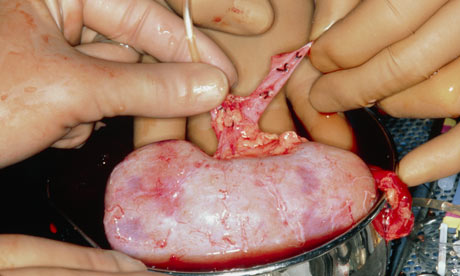
Rhonda Fahmy was amazed when she first saw the scar on her body. The 25-year-old had agreed to donate a kidney to her father – an operation that normally takes six or seven hours in theatre, and weeks to recover from. Yet for Rhonda the surgery lasted just 45 minutes – and left her with a scar only one inch long.
Last week Professor Nadey Hakim, a surgeon at London's Hammersmith Hospital, removed Rhonda's kidney using a technique he has pioneered – and the one-inch cut is said to be a record for such operations. Now transplant charities believe his work could encourage more living donors to come forward, offering hope to the almost 7,000 people in the UK currently waiting for kidney transplants.
Hakim has taken years to perfect his operation, which combines the skills of traditional and keyhole surgery, yet his methods are already being used in the US and Belgium. "I think this will revolutionise kidney transplants. I used to think a 10cm incision was small enough," he says. "People thought you can't make it less than this – but I kept making it smaller and smaller."
Traditional kidney surgery is done by making a 15- 20cm [6-8in] incision, which takes a toll on the body. "It's quite detrimental to the patient because its a big incision, and you have to cut through all the muscles," Hakim explains. "It's painful and the recovery is very slow. It can cause hernias, too, and discomfort, so people are discouraged from doing the operation to help anyone."
In recent years, surgeons have turned to keyhole surgery, in which the incision is only seven to eight centimetres long, yet this too has its drawbacks, he says. "You need to make five holes for keyhole surgery. The incision must be seven or eight centimetres because you have to put all your hand inside to operate. And you have to have holes to put the camera and instruments in. You can have complications, such as holes in the bowels or injuries to the spleen, and uncontrollable bleeding."
His new method involves wearing magnifying goggles to make a small cut of about an inch long. The cut is deep, moving through the skin, muscle, fat and down to the kidney itself. Using retractors – curved steel surgical tools with lights on the end, which Hakim has designed – to pull open the small cut, the surgeon cuts away the fat surrounding the kidney.
The vessels leading to the kidney – the artery, vein and ureter (which takes urine to the bladder) are then stapled closed and cut – leaving the kidney free. With the blood supply cut off, the kidney becomes soft and sponge-like and can be turned round with the surgeon's fingers to slip through the smallest of cuts.
Hakim calls this method "finger assisted . . . you use your fingers to feel the kidney so you know where you are. And you pull it out using your thumb and index finger." Not only does this new procedure minimise any discomfort for the patient, but the speed and simplicity of the operation means it costs the NHS less than keyhole surgery – around £2,000 less, the surgeon estimates.
Hakim insists the operation – and he has performed more than 500 – is very safe – although he admits the surgery requires a high level of concentration. "This is the most delicate operation you can do – not the most difficult – but delicate because you are dealing with a healthy person who is putting his or her life at risk to donate an organ. You have to be not just 100%, but 1,000% sure about it."
One in three kidney transplant operations now involve an organ from a living person, according to Rosemary Macri from the British Kidney Patient's association. Yet she says many donors can be discouraged, because the removal is such a serious operation. She believes that Hakim's method, after which patients can be home in just 48 hours and back to normal in just a week, could convince more people to offer their organs.
"There are already people – family, friends and colleagues – who are prepared to donate for a loved one – but it's a serious undertaking. People have work and other commitments and I'm sure some people can be put off. If the recovery time is shortened, that could make the difference. If an operation can be made to have less of an impact on them, that's got to be good news."

